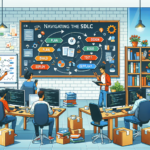As we move towards 2025, the convergence of emerging technologies is revolutionizing the global business landscape. From artificial intelligence (AI) to blockchain, quantum computing, and the Internet of Things (IoT), businesses are increasingly leveraging these technologies to foster innovation, enhance productivity, and create sustainable practices that respond to evolving consumer demands. This article explores how these emerging trends shape our economy and what businesses can expect in the near future.
Artificial Intelligence and Automation
AI continues to be a game-changer for numerous industries. Organizations are integrating machine learning algorithms and data analytics into their workflows, leading to enhanced decision-making and efficiency. With advancements in natural language processing, AI-driven chatbots and virtual assistants are improving customer service, providing 24/7 support while reducing operational costs.
In 2025, we can expect AI to further automate routine tasks, allowing employees to focus on strategic initiatives that require creativity and problem-solving. Additionally, AI’s role in predictive analytics will enable businesses to anticipate customer trends, helping them to tailor their products and marketing strategies accordingly.
Blockchain Technology
Blockchain technology is reshaping industries such as finance, supply chain, and healthcare by providing transparency and security. Its decentralized nature enhances trust among stakeholders, enabling secure transactions without intermediaries. By 2025, we anticipate greater adoption of blockchain solutions to streamline processes and reduce fraud.
For example, in supply chain management, blockchain can provide end-to-end visibility, ensuring product authenticity and tracking shipments in real-time. In finance, blockchain can facilitate faster transactions and reduce costs associated with cross-border payments. As more businesses recognize the benefits of blockchain, expect to see increased regulatory frameworks that will encourage its responsible implementation.
The Internet of Things (IoT)
The IoT is another transformative force, connecting a multitude of devices to gather data and optimize operations. In 2025, businesses will be utilizing IoT technologies for smart factories, enhancing operational efficiencies and reducing waste in manufacturing processes. Wearable technologies are also gaining traction, allowing companies to monitor employee health and safety and improve workplace conditions.
Furthermore, as consumers increasingly expect connected-experiences, businesses that effectively integrate IoT into their product offerings will create new revenue streams. For example, IoT-enabled home appliances can provide maintenance notifications or energy usage insights, enhancing customer value while allowing manufacturers to gather valuable feedback for product improvement.
Quantum Computing
While still in its infancy, quantum computing holds untapped potential for businesses. With its ability to process complex datasets at unprecedented speeds, it will revolutionize fields such as drug discovery, logistics, and financial modeling. By 2025, we can expect breakthroughs in quantum computing applications that will optimize supply chains, enable advanced simulations, and accelerate research and development.
However, many organizations may face challenges in utilizing quantum computing due to its complexity. Businesses will need to develop strategic partnerships with technology providers to build the necessary expertise to implement quantum solutions effectively.
Adopting a Sustainable Approach
Emerging technologies are not only driving innovation but also encouraging businesses to adopt more sustainable practices. With increasing consumer awareness around environmental issues, companies are prioritizing corporate social responsibility (CSR) initiatives. Technologies such as AI and IoT are being leveraged to minimize resource waste and carbon emissions.
By 2025, businesses that embed sustainability into their core operations will likely witness improvements in brand loyalty and consumer trust. The shift towards sustainable practices is expected to accelerate as regulations become stricter, mandating corporations to report on their environmental impact.
Conclusion
As we approach 2025, businesses must harness emerging technologies to remain competitive and meet the demands of a rapidly changing market. The advantages offered by AI, blockchain, IoT, and quantum computing will be critical for organizations seeking to improve efficiency, create innovative products, and foster sustainability.
For businesses to navigate this technology-driven landscape successfully, they need to adopt a proactive approach, constantly analyzing market trends and adjusting their strategies accordingly. The future is bright for organizations that embrace digital transformation and leverage the powerful potential of emerging technologies.
FAQs
1. What are the key emerging technologies shaping the business landscape?
The key emerging technologies include artificial intelligence (AI), blockchain, the Internet of Things (IoT), and quantum computing.
2. How does artificial intelligence impact businesses?
AI enhances decision-making, automates routine tasks, and improves customer service through chatbots and predictive analytics.
3. What role does blockchain play in business?
Blockchain offers transparency, security, and efficiency in transactions, particularly in finance and supply chain management.
4. How can businesses leverage IoT?
Businesses can use IoT to gather data for optimizing operations, offering connected experiences, and enhancing customer engagement.
5. Why is sustainability important for businesses?
Sustainability is crucial for building brand loyalty and consumer trust, and it is increasingly being mandated by regulations. Emerging technologies facilitate sustainable practices by reducing waste and improving resource management.











